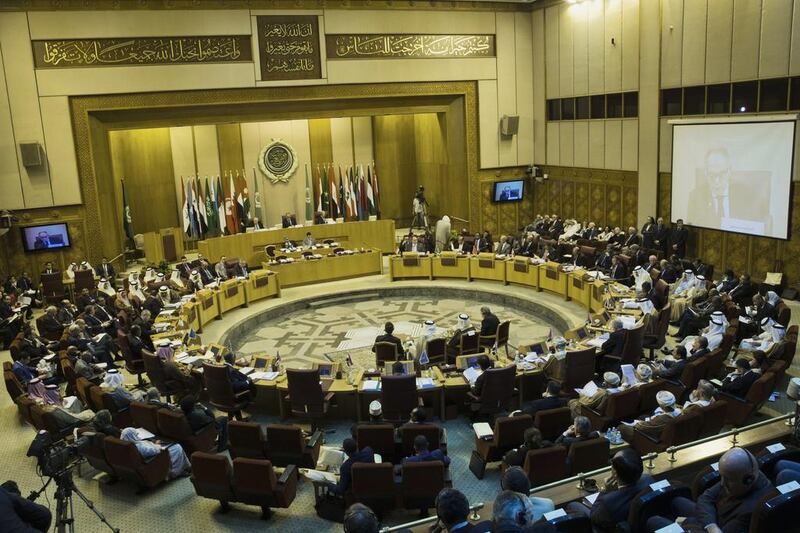CAIRO // Arab League foreign ministers yesterday created the possiblity of military action by member states against ISIL after they agreed to use all necessary measures to confront the group.
Foreign ministers also agreed to cooperate with all international, regional and national efforts to combat militant groups and endorsed a UN Security Council resolution passed last month calling on member states to act to stem the flow of logistical, military and financial support to extremists in Iraq and Syria.
Before the meeting in Cairo began, secretary general Nabil Elaraby said ISIL and other militants threatened the existence of Arab states.
The meeting of Arab foreign ministers came as the United States expanded air strikes against the militants in Iraq and sought wider regional backing for its campaign.
“What is needed is a clear decision for a comprehensive confrontation, militarily and politically,” Mr Elaraby said a day after he and US secretary of state John Kerry discussed taking action against the group that controls parts of Syria and Iraq.
The league’s statement was a boost for Barack Obama, who last week said Arab support was crucial to help the US, and a coalition of nine other countries, fight the group.
“What we have got to make sure is that we are organising the Arab world, the Middle East, the Muslim world, along with the international community to isolate this cancer.”
The US president said on Sunday that he will make a speech to lay out his “game plan” to deal with and ultimately defeat ISIL on Wednesday, but warned he would not wage another ground war in Iraq.
Mr Elaraby criticised infighting between Arab countries, which he said had led to inaction by the 22-member bloc.
“While some states object to allowing the Arab League to intervene in their internal crises, the floodgates are opened to foreign intervention, including militarily,” he said.
Mr Elaraby, a former foreign minister of Egypt, called for the activation of an Arab defence treaty to allow for military action when needed.
Iraq on Saturday welcomed Mr Obama’s plan for an international coalition against ISIL fighters as a “strong message of support”, after repeatedly calling for aid in its fight.
Mr Obama outlined the plan at a Nato summit on Friday for a broad coalition to defeat ISIL, which led an offensive that overran parts of Iraq in June and also holds significant territory in Syria.
ISIL was originally an Al Qaeda affiliate in Iraq that expanded in the Syrian conflict.
The group’s astonishing rise in Syria and Iraq caught the weak government in Baghdad, and much of the region, off guard.
Mr Elaraby said ISIL was a threat to the entire region.
“What is happening in Iraq is that the terrorist organisation not only threatens a state’s authority, but threatens its very existence and the existence of other states.”
Arab countries have participated in western-led military campaigns in the past, including the first Gulf War and the aerial campaign against former Libyan dictator Muammar Qaddafi.
Aside from fighting in Iraq, Arab states are concerned that ISIL is coordinating with domestic extremists and that militants who travelled to join the group may conduct attacks on their return home.
In Egypt, several militants who have carried out attacks on security forces since the army overthrew Islamist president Mohammed Morsi in 2013 had travelled to fight in Syria.
Egypt’s main militant group, Ansar Beit Al Maqdis, has not publicly pledged its loyalty to ISIL, but has referred to the militants as “brothers”.
The league also discussed the Gaza conflict, the political crisis in Yemen and peace talks in Sudan.
The UAE delgation in Cairo was led by Dr Anwar Gargash, Minister of State for Foreign Affairs.
* Agence France-Presse and Wam





